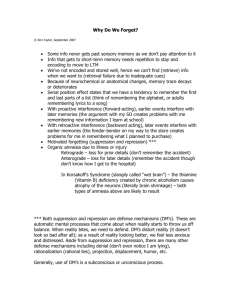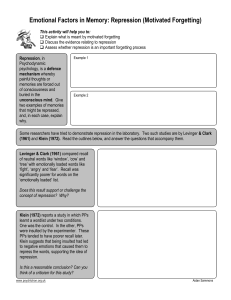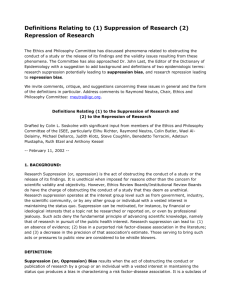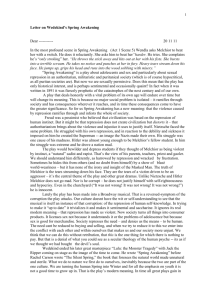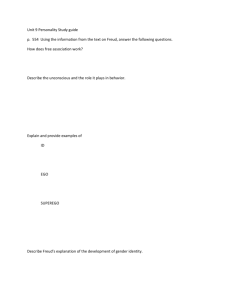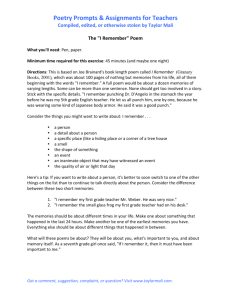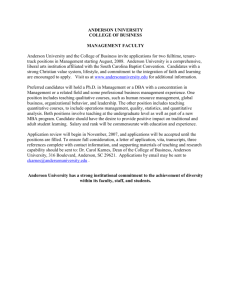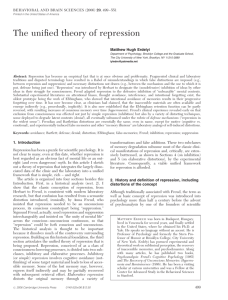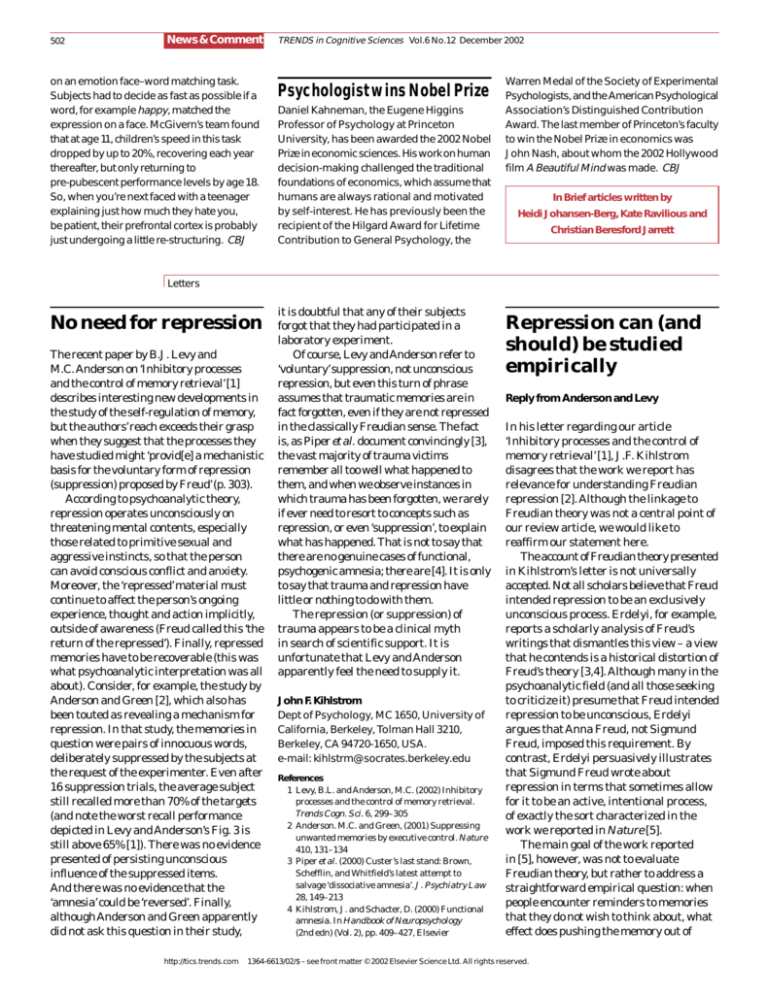
502
News & Comment
on an emotion face–word matching task.
Subjects had to decide as fast as possible if a
word, for example happy, matched the
expression on a face. McGivern’s team found
that at age 11, children’s speed in this task
dropped by up to 20%, recovering each year
thereafter, but only returning to
pre-pubescent performance levels by age 18.
So, when you’re next faced with a teenager
explaining just how much they hate you,
be patient, their prefrontal cortex is probably
just undergoing a little re-structuring. CBJ
TRENDS in Cognitive Sciences Vol.6 No.12 December 2002
Psychologist wins Nobel Prize
Daniel Kahneman, the Eugene Higgins
Professor of Psychology at Princeton
University, has been awarded the 2002 Nobel
Prize in economic sciences. His work on human
decision-making challenged the traditional
foundations of economics, which assume that
humans are always rational and motivated
by self-interest. He has previously been the
recipient of the Hilgard Award for Lifetime
Contribution to General Psychology, the
Warren Medal of the Society of Experimental
Psychologists, and the American Psychological
Association’s Distinguished Contribution
Award. The last member of Princeton’s faculty
to win the Nobel Prize in economics was
John Nash, about whom the 2002 Hollywood
film A Beautiful Mind was made. CBJ
In Brief articles written by
Heidi Johansen-Berg, Kate Ravilious and
Christian Beresford Jarrett
Letters
No need for repression
The recent paper by B.J. Levy and
M.C. Anderson on ‘Inhibitory processes
and the control of memory retrieval’ [1]
describes interesting new developments in
the study of the self-regulation of memory,
but the authors’ reach exceeds their grasp
when they suggest that the processes they
have studied might ‘provid[e] a mechanistic
basis for the voluntary form of repression
(suppression) proposed by Freud’ (p. 303).
According to psychoanalytic theory,
repression operates unconsciously on
threatening mental contents, especially
those related to primitive sexual and
aggressive instincts, so that the person
can avoid conscious conflict and anxiety.
Moreover, the ‘repressed’ material must
continue to affect the person’s ongoing
experience, thought and action implicitly,
outside of awareness (Freud called this ‘the
return of the repressed’). Finally, repressed
memories have to be recoverable (this was
what psychoanalytic interpretation was all
about). Consider, for example, the study by
Anderson and Green [2], which also has
been touted as revealing a mechanism for
repression. In that study, the memories in
question were pairs of innocuous words,
deliberately suppressed by the subjects at
the request of the experimenter. Even after
16 suppression trials, the average subject
still recalled more than 70% of the targets
(and note the worst recall performance
depicted in Levy and Anderson’s Fig. 3 is
still above 65% [1]). There was no evidence
presented of persisting unconscious
influence of the suppressed items.
And there was no evidence that the
‘amnesia’ could be ‘reversed’. Finally,
although Anderson and Green apparently
did not ask this question in their study,
http://tics.trends.com
it is doubtful that any of their subjects
forgot that they had participated in a
laboratory experiment.
Of course, Levy and Anderson refer to
‘voluntary’suppression, not unconscious
repression, but even this turn of phrase
assumes that traumatic memories are in
fact forgotten, even if they are not repressed
in the classically Freudian sense. The fact
is, as Piper et al. document convincingly [3],
the vast majority of trauma victims
remember all too well what happened to
them, and when we observe instances in
which trauma has been forgotten, we rarely
if ever need to resort to concepts such as
repression, or even ‘suppression’, to explain
what has happened. That is not to say that
there are no genuine cases of functional,
psychogenic amnesia; there are [4]. It is only
to say that trauma and repression have
little or nothing to do with them.
The repression (or suppression) of
trauma appears to be a clinical myth
in search of scientific support. It is
unfortunate that Levy and Anderson
apparently feel the need to supply it.
John F. Kihlstrom
Dept of Psychology, MC 1650, University of
California, Berkeley, Tolman Hall 3210,
Berkeley, CA 94720-1650, USA.
e-mail: kihlstrm@socrates.berkeley.edu
References
1 Levy, B.L. and Anderson, M.C. (2002) Inhibitory
processes and the control of memory retrieval.
Trends Cogn. Sci. 6, 299–305
2 Anderson. M.C. and Green, (2001) Suppressing
unwanted memories by executive control. Nature
410, 131–134
3 Piper et al. (2000) Custer’s last stand: Brown,
Schefflin, and Whitfield’s latest attempt to
salvage ‘dissociative amnesia’. J. Psychiatry Law
28, 149–213
4 Kihlstrom, J. and Schacter, D. (2000) Functional
amnesia. In Handbook of Neuropsychology
(2nd edn) (Vol. 2), pp. 409–427, Elsevier
Repression can (and
should) be studied
empirically
Reply from Anderson and Levy
In his letter regarding our article
‘Inhibitory processes and the control of
memory retrieval’ [1], J.F. Kihlstrom
disagrees that the work we report has
relevance for understanding Freudian
repression [2]. Although the linkage to
Freudian theory was not a central point of
our review article, we would like to
reaffirm our statement here.
The account of Freudian theory presented
in Kihlstrom’s letter is not universally
accepted. Not all scholars believe that Freud
intended repression to be an exclusively
unconscious process. Erdelyi, for example,
reports a scholarly analysis of Freud’s
writings that dismantles this view – a view
that he contends is a historical distortion of
Freud’s theory [3,4]. Although many in the
psychoanalytic field (and all those seeking
to criticize it) presume that Freud intended
repression to be unconscious, Erdelyi
argues that Anna Freud, not Sigmund
Freud, imposed this requirement. By
contrast, Erdelyi persuasively illustrates
that Sigmund Freud wrote about
repression in terms that sometimes allow
for it to be an active, intentional process,
of exactly the sort characterized in the
work we reported in Nature [5].
The main goal of the work reported
in [5], however, was not to evaluate
Freudian theory, but rather to address a
straightforward empirical question: when
people encounter reminders to memories
that they do not wish to think about, what
effect does pushing the memory out of
1364-6613/02/$ – see front matter © 2002 Elsevier Science Ltd. All rights reserved.
News & Comment
awareness have on their later ability to
recall it? People confront this situation all
the time, whether one’s goal is to simply
avoid a mildly distracting thought, or to
prevent oneself from being overwhelmed
by unpleasant remindings. That people
engage in such behavior is self-evident,
but its consequences for episodic memory
are not. What our work shows is that with
time, and repeated effort, trying to keep an
unwanted memory out of awareness does
under some circumstances render that
memory less accessible, even when people
want to recall it. These findings have clear
relevance to motivated forgetting.
Kihlstrom’s letter also questions the
potency of the suppression effect reported
in the Nature article. Kihlstrom notes that
after many suppression attempts, subjects
could still recall many of the word pairs,
suggesting that suppression was not very
effective. This observation is misleading.
Although subjects attempted to suppress
items as many as 16 times, each attempt
lasted only 4 seconds, with the total time
spent suppressing an item barely exceeding
one minute. That after such a brief interval,
subjects were up to 10% worse at recalling
the memories suggests a very effective
process. Furthermore, the tendency
reported in the article was for suppression
to increase with repetitions. In naturalistic
cases of memory avoidance, people are
likely to persist in suppressing unwanted
memories for more protracted periods than
we tested in our study. Thus, there is ample
reason to suspect that suppression can be
effective with sustained effort.
However, it is also important to
highlight what the work does not establish.
We agree with Kihlstrom on several points.
First, our work does not demonstrate
unconscious repression. Those clinicians
who believe in the instantaneous and
automatic thrusting of traumatic memories
into the unconscious will find little support
in our work. Indeed, we suspect that most
cases of motivated forgetting arise from
persisting attempts to control awareness
strategically. Second, our work does not yet
establish whether inhibitory control
processes are effective for emotionally
charged memories. Undoubtedly,
emotionally charged memories will be more
intrusive and more difficult to suppress.
Nevertheless, we suspect that emotional
and neutral memories differ primarily in
their degrees of intrusiveness, and that
with time and persistence even emotional
memories may be subject to suppression.
http://tics.trends.com
TRENDS in Cognitive Sciences Vol.6 No.12 December 2002
Some will disagree with the above
conjectures. Such disagreement is
reasonable, and we would like to encourage
the field to pursue these questions
empirically. What seems less useful is to
classify repression as a myth and to
discourage scientists from careful inquiry
into its properties. Whether the processes
reported in [5] and reviewed in [1] account
for real cases of motivated forgetting is
ultimately an empirical question that
seems quite worthwhile to pursue.
Michael C. Anderson
Benjamin Levy
Dept of Psychology, 1227 University of
Oregon, Eugene, OR 97403-1227, USA.
e-mail: blevy@darkwing.uoregon.edu;
mcanders@darkwing.uoregon.edu
References
1 Levy, B.L. and Anderson, M.C. (2002) Inhibitory
processes and the control of memory retrieval.
Trends Cogn. Sci. 6, 299–305
2 Kihlstrom, J.F. (2002) No need for repression.
Trends Cogn. Sci. 6, 502
3 Erdelyi, M.H. (1990) Repression, reconstruction, and
defense: history and integration of the psychoanalytic
and experimental frameworks. In Repression and
Dissociation: Implications for Personality Theory,
Psychopathology, and Health (Singer, J.L., ed.),
pp. 1–31, University of Chicago Press
4 Erdelyi, M.H. (2001) Defense processes can be
conscious or unconscious. Am. Psychol. 56, 761–762
5 Anderson. M.C. and Green, (2001) Suppressing
unwanted memories by executive control. Nature
410, 131–134
Frames of reference
and language
concepts
The claim that language affects thought –
the ‘Whorfian Hypothesis’ – has a long
history, and over the years has elicited
strong support as well as fierce criticism.
Gallistel [1] reviewed some recent studies
that tested the Whorfian hypothesis in the
spatial domain, that is, whether
differences in spatial language affected
non-linguistic conceptualization of space.
Languages differ in the frames of
reference used for describing spatial
locations. Three distinct frames of reference
have been identified: intrinsic, absolute and
relative [2]. Some languages only use one
of these, whereas others might use a
combination of two, or even all three.
Pederson et al. conducted a series of
experiments demonstrating that speakers
of a relative-frame language differed in
503
their performance in a memory task from
speakers of an absolute-frame language [3].
When asked to recall and reproduce a
display of toy animals, relative-frame
speakers reproduced the display consistent
with a relative frame of reference, whereas
absolute speakers reproduced it in an
absolute frame. This result is consistent
with the Whorfian hypothesis. However, in
a recent study, Li and Gleitman [4] argued
that there was a confound in the Pederson
et al. study. Li and Gleitman claimed that
the difference in recall between the different
language groups was due to the conditions
in which the groups were tested: indoors
versus outdoors. They presented empirical
evidence that appeared to show that the
differences Pederson et al., reported were
due to environmental features rather than
differences between the languages.
However, since Gallistel’s report,
Levinson et al. [5] have published an
article that refutes Li and Gleitman’s
claims. First, they show that across the
language groups that Pederson et al.
tested there was no confounding of test
location: speakers behaved in accordance
with the frame of reference of their
language, regardless of whether they
were tested indoors or outdoors. This is
counter to the claims of Li and Gleitman.
Secondly, they show that Li and Gleitman
confounded absolute and intrinsic frames
of reference in the experiments that they
themselves conducted. When Levinson et al.
made the appropriate distinction between
these two frames of reference, and tested
Dutch speakers, they found that Dutch
speakers only ever responded in a way
that was consistent with the way their
language codes space. No environmental
manipulation made Dutch speakers
change to an absolute coding of space.
Again, this is counter to the evidence
presented by Li and Gleitman.
Gallistel wrote that all human beings
perceive space in the same way and
neurally encode space in the same way;
furthermore, he stated that the brain has to
encode spatial relations in several different
coordinate frameworks. Given these facts,
he asked how Whorfian effects would be
instantiated in the brain. There are two
important points to note about this.
First, neither Pederson et al. nor
Levinson et al. make any claims about the
perceptual abilities of different language
groups; their claims are about conceptual
representations. The claim is that the
habitual use of particular linguistic
1364-6613/02/$ – see front matter © 2002 Elsevier Science Ltd. All rights reserved.

